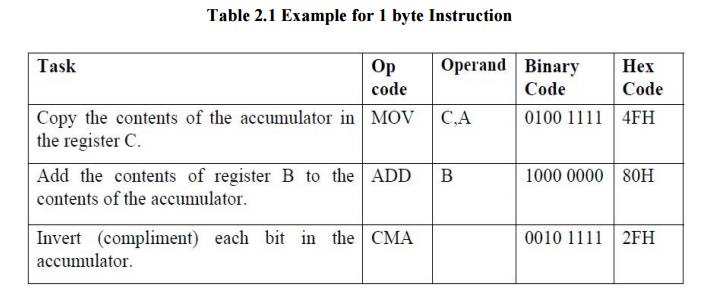Chapter: Microprocessor and Microcontroller : Programming of 8085 Processor
Instruction Format - Programming of 8085 Processor
PROGRAMMING OF 8085 PROCESSOR
Instruction Format
An
instruction is a command to the microprocessor to perform a given task on a
specified data. Each instruction has two parts: one is task to be performed,
called the operation code (opcode), and the second is the data to be operated
on, called the operand. The operand (or data) can be specified in various ways.
It may include 8-bit (or 16-bit) data, an internal register, a memory location,
or 8-bit (or 16-bit) address. In some instructions, the operand is implicit.
Instruction word size
The 8085
instruction set is classified into the following three groups according to word
size:
ü One-word
or 1-byte instructions
ü Two-word
or 2-byte instructions
ü Three-word
or 3-byte instructions
In the
8085, "byte" and "word" are synonymous because it is an
8-bit microprocessor. However, instructions are commonly referred to in terms
of bytes rather than words.
1 One-Byte Instructions
A 1-byte
instruction includes the opcode and operand in the same byte. Operand(s) are
internal register and are coded into the instruction

These
instructions are 1-byte instructions performing three different tasks. In the
first instruction, both operand registers are specified. In the second
instruction, the operand B is specified and the accumulator is assumed.
Similarly, in the third instruction, the accumulator is assumed to be the
implicit operand. These instructions are stored in 8- bit binary format in memory;
each requires one memory location.
MOV rd, rs
rd ß rs copies contents of rs into rd.
Coded as
01 ddd sss
where ddd
is a code for one of the 7 general registers which is the destination of the
data, sss is the code of the source register.
Example: MOV A,B
Coded as
01111000 = 78H = 170 octal (octal was used extensively in instruction design of
such processors).
ADD r
A ß A + r
2 Two-Byte Instructions
In a
two-byte instruction, the first byte specifies the operation code and the
second byte specifies the operand. Source operand is a data byte immediately
following the opcode. For example:
Table 2.2 Example for 2 byte Instruction

The
instruction would require two memory locations to store in memory.
MVI r,data
r ß data
Example:
MVI A,30H coded as 3EH 30H as two contiguous bytes.
This is
an example of immediate addressing.
ADI data
A ß A + data
OUT port
0011 1110
DATA
Where
port is an 8-bit device address. (Port) ß A.
Since the
byte is not the data but points directly to where it is located this is called
direct addressing.
3 Three-Byte Instructions
In a
three-byte instruction, the first byte specifies the opcode, and the following
two bytes specify the 16-bit address. Note that the second byte is the low-order
address and the third byte is the high-order address.
opcode +
data byte + data byte
Table 3.3 Example for 3 byte Instruction

This
instruction would require three memory locations to store in memory.
Three
byte instructions - opcode + data byte + data byte
LXI rp, data16
rp is one
of the pairs of registers BC, DE, HL used as 16-bit registers. The two data
bytes are 16-bit data in L H order of significance.
rp ß data16
LXI
H,0520H coded as 21H 20H 50H in three bytes. This is also immediate addressing.
LDA addr
A ß (addr) Addr is a 16-bit address in L H order.
Example:
LDA 2134H coded as 3AH 34H 21H. This is also an example of direct addressing.
Related Topics